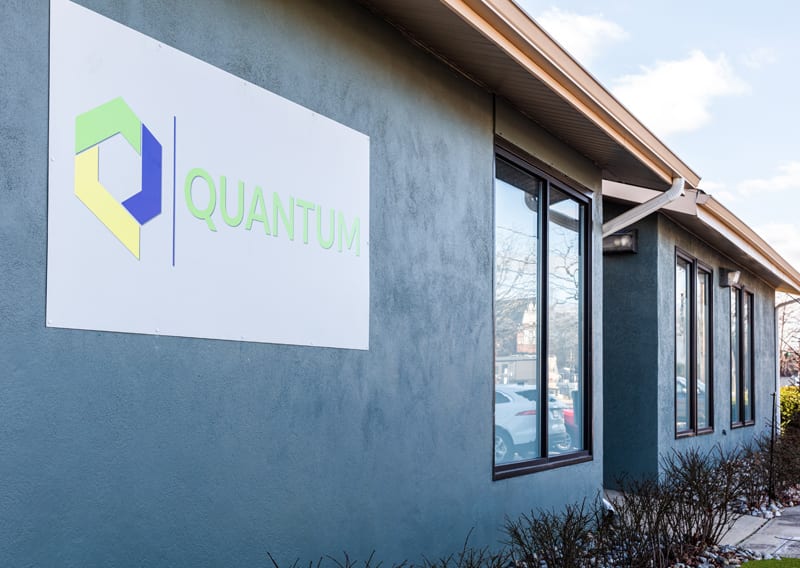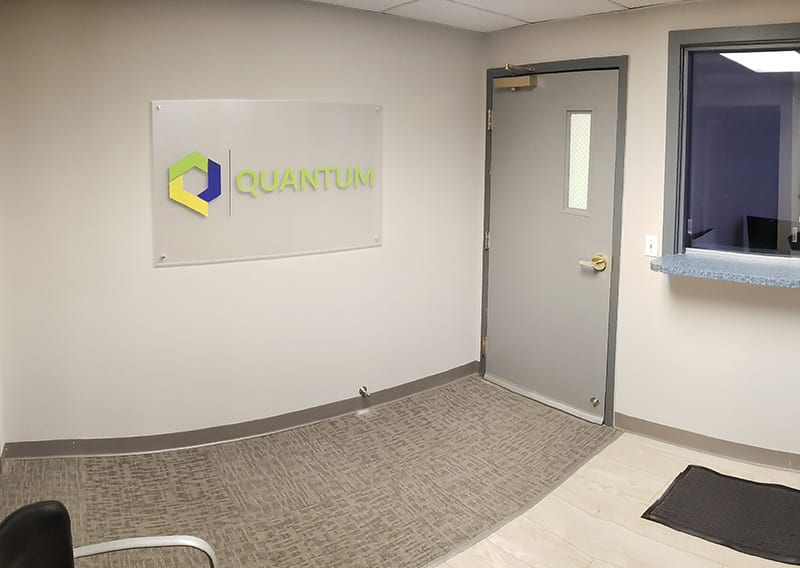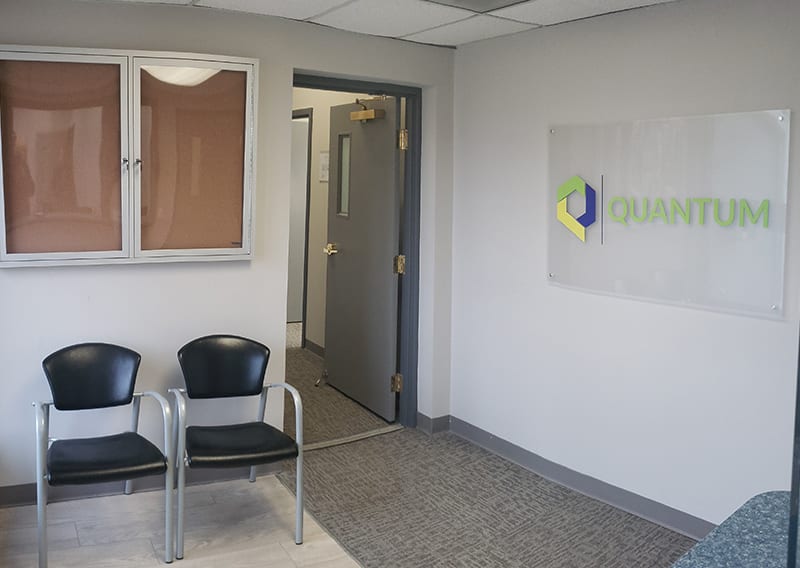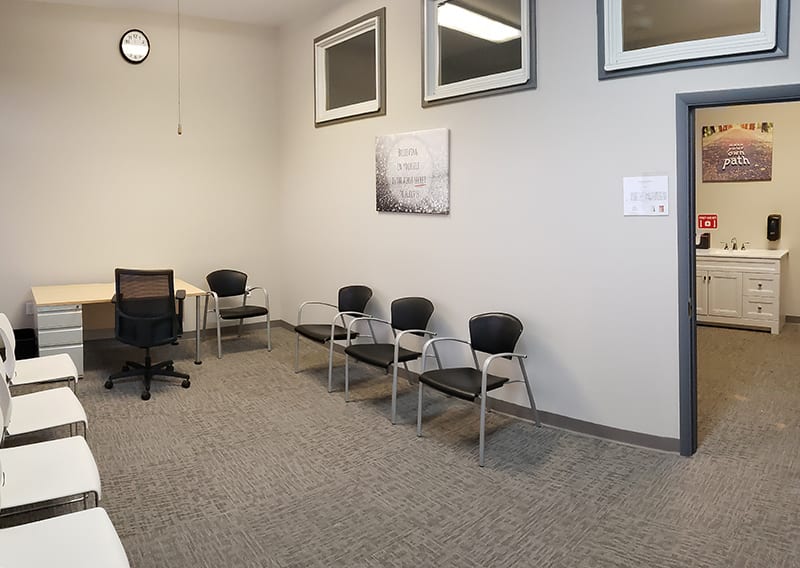Our facility is a warm, inviting, cozy, and secure environment that provides the perfect level of safety, comfort, and privacy as you receive treatment and get on your path to wellness. We’ve designed our space to allow for a low-stress environment where you can focus on your well-being.
Given the concerns of the COVID pandemic, we’re ensuring procedures are followed to create a clean environment for our patients, staff, and visitors. We’ve gone above and beyond CDC and New Jersey State guidance to design our cleaning and disinfecting protocol so that there is no question of the cleanliness and safety of our facility.
You’re here to get well and our priority is maintaining a safe, clean, peaceful, and welcoming environment for you to do just that.
To see our response to Covid-19, click here.
Photo Gallery
Click photos to enlarge
Are You Ready to Begin Your Journey to Recovery?
You could be completely covered. Verify Your Insurance Today.
The Quantum
Process Outpatient Rehab NJ
1. Make the Call
Contact our Quantum Team at
(609) 993 – 0733 to get started.
2. Complete
Your Intake
This streamlined process includes a series of questions and discussion of your unique needs and goals.
3. Get the Best Care Team Possible
After your intake, you’ll meet your Care Team, a group of amazing professionals dedicated to helping you make recovery reality.
4. On-Going Support
After you meet your Care Team, you’ll start to receive treatment based on a Care Plan that’s designed to help you achieve and sustain your recovery.
What are Amphetamines?
Amphetamines can either be prescription medications or illegal substances, like methamphetamine. They have an effect on the central nervous system (CNS) that causes a person to feel more focused, alert, and energized. As a prescription medication, amphetamines are used to treat obesity, attention-deficit hyperactivity disorder (ADHD), and narcolepsy. The FDA classifies them as Schedule II substances, meaning they have a potential for abuse. Stimulants like these can be very effective for treating attention-deficit hyperactivity disorder (ADHD), but they are also used for non-prescription purposes to stay awake or get high. When taken for a disorder they are safe to use, but with amphetamine abuse, there is a potential for stimulant use disorders. Some prescription types of amphetamines include:
- Ritalin (dextromethylphenidate)
- Adderall (a combination of dextroamphetamine and amphetamine)
- Vyvanse (lisdexamfetamine)
- Evekeo (amphetamine)
- Dexedrine (dextroamphetamine)
Prescription amphetamines are usually available in capsule or pill form. It is usually taken by swallowing pills, however with amphetamine abuse, individuals will crush the pills to either snort them or mix them with water to inject directly into veins to achieve faster effects of amphetamines. Street amphetamines can also come in liquid, paste, powder, or crystal form, which is injected, snorted, or smoked.
Effects of Amphetamines
Taking amphetamines causes a stimulating effect throughout the rest of the body. The effects of amphetamines can differ among types of amphetamines, however they all stimulate the central nervous system and the reward center of the brain by releasing dopamine and norepinephrine which causes a person to want to experience the medication again. Short term effects of amphetamines include:
- Increased concentration and focus
- Feelings of euphoria or a high
- Increased energy
- Quicker reaction times
- Rapid heart and breathing rate
- Increased blood pressure
- Increased blood sugar
- Decreased blood flow to organs
Signs of Amphetamine Abuse and Addiction
Like many substance use disorders, amphetamine addiction can happen slowly and you may miss early amphetamine addiction signs. Although a proper diagnosis from a medical professional is needed, there are signs and symptoms that may indicate amphetamine dependence which can let you know addiction treatment may be needed. Some signs and symptoms of amphetamine addiction includes:
- Strong cravings for amphetamines
- Tolerance to amphetamines and needing more of the drug to get same effect
- Dedicating a lot of time to acquiring, taking, and recovering from the effects of amphetamines
- Failed attempts to stop depending on amphetamines
- Continual use of amphetamines despites problems in relationships, health, or career due to drug abuse
- No longer interested in the same social or recreational activities as before
- Reduced performance at work or school due to amphetamine abuse
- Experiencing withdrawal symptoms when stopping usage of stimulants
Amphetamine Withdrawal Symptoms
Amphetamine withdrawal is one of the tell tale signs there is an amphetamine addiction present. When a person develops a drug dependence, the body no longer knows how to function without it, so when the substance is no longer available, the body starts to experience withdrawal symptoms. Different types of amphetamines have their own withdrawal symptoms, but some common symptoms of amphetamine withdrawal include:
- Cravings
- Anxiety
- Depression
- Unable to feel pleasure
- Cognitive issues
- Sleep problems
- Fatigue and loss of energy
- Confusion
Long Term Side Effects of Amphetamine Abuse
Long-term substance abuse can wreak havoc on a person’s health, their personal life, career, and lead to legal problems. When used as directed by a prescribing physician, amphetamines are safe to use long-term, however long-term amphetamine dependence can lead to several health problems, including death. They can also lead to co-occurring disorders such as depression and anxiety. Some long-term symptoms of amphetamine abuse include:
- Panic attacks
- Depression
- Anxiety disorders
- Weight loss and malnutrition
- Cardiovascular disease
- Mood swings
- Insomnia
- Aggression
- Seizures
Amphetamine Addiction Treatment
No matter how severe a person’s amphetamine addiction is, there is help out there with several types of treatment. For those with severe substance use disorders, rehab centers offer the best approach to treatment for amphetamine abuse and addiction. There are several levels of care available for amphetamine addiction treatment. Many people choose to start in a drug detox with medication assisted treatment in order to go through withdrawal symptoms comfortably and better their chances of drug detox successfully. Drug rehab includes inpatient treatment, intensive outpatient treatment, partial hospitalization, and outpatient treatment options to fit every individual’s amphetamine addiction needs. Dual diagnosis programs can help treat co occurring disorders through individual therapy and medication assisted treatment. Many addiction treatment programs emphasize their relapse prevention program to ensure their clients will be successful in the real world.
If you or someone you love is struggling with amphetamine addiction, help is available. Quantum Behavioral Health Services is available to answer your questions about amphetamine addiction treatment.








